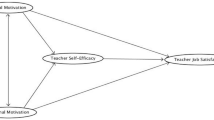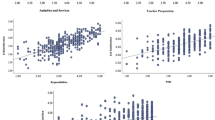Abstract
This study employed a partially-mixed concurrent equal-status design to investigate factors motivating Chinese teachers to enter the teaching profession and sources of teacher job satisfaction in China as opposed to those described in the international literature. The data were collected in Jilin Province of China from 510 teachers who participated in a survey. The quantitative results indicated that Chinese teachers were motivated by both intrinsic (e.g. liking to be a teacher) and extrinsic factors (e.g. salary) to enter the teaching profession. Furthermore, MANOVA showed that teachers who were more intrinsically motivated to enter the teaching profession reported a higher level of job satisfaction. Qualitative data revealed that some job-satisfaction factors were universal across countries and some were specific to China. This study offered some implications for educational policy makers and practitioners worldwide and in China.
Similar content being viewed by others
References
Belfield, C. R. (2005). Workforce gender effects on firm performance and workers’ pay: Evidence for the UK. Applied Economics, 37, 885–891. doi:10.1080/00036840500048829.
Billingsley, B. S., & Cross, L. H. (1992). Predictors of commitment, job satisfaction, and intent to stay in teaching: A comparison of general and special educators. The Journal of Special Education, 25, 453–471. doi:10.1177/002246699202500404.
Chen, W. (2007). The structure of secondary school teacher job satisfaction and its relationship with attrition and work enthusiasm. Chinese Education and Society, 40(5), 17–31.
Chen, J. (2010). Chinese middle school teacher job satisfaction and its relationships with teacher moving. Asia Pacific Education Review, 11, 263–272. doi:10.1007/s12564-010-9085-1.
Cronbach, L. J. (1951). Coefficient alpha and the internal structure of tests. Psychometrika, 16, 297–334.
Darling-Hammond, L. (2003). Keeping good teachers. Educational Leadership, 60(8), 7–13.
Ding, Y., Kuo, Y. L., & Van Dyke, D. C. (2008). School psychology in China (PRC), Hong Kong, and Taiwan: A cross-regional perspective. School Psychology International, 29, 529–548. doi:10.1177/0143034308099200.
Ding, W., & Lehrer, S. (2007a). Improving teacher quality in China. In E. Hannum & A. Park (Eds.), Education and reform in China (pp. 191–204). Oxon: Routledge.
Ding, W., & Lehrer, S. F. (2007b). Do peers affect student achievement in China’s secondary schools? Review of Economics and Statistics, 89, 300–312.
Dinham, S., & Scott, C. (2000). Moving into the third, outer domain of teacher satisfaction. Journal of Educational Administration, 38, 379–396. doi:10.1108/09578230010373633.
Feng, B. (2007). A study of teacher job satisfaction and factors that influence it. Chinese Education and Society, 40(5), 47–64.
Garrett, R. M. (1999). Teacher job satisfaction in developing countries. (ERIC Document Reproduction Service No. ED459150).
Glaser, B. G., & Strauss, A. L. (1967). The discovery of grounded theory: Strategies for qualitative research. Chicago, IL: Aldine.
Herzberg, F., Mausner, B., & Snyderman, B. (1959). The motivation to work. New York: Wiley.
Ho, C., & Au, W. (2006). Teaching satisfaction scale. Educational and Psychological Measurement, 66, 172–185. doi:10.1177/0013164405278573.
Hofstede, G. (1980). Culture’s consequences: International differences in work-related values. Beverly Hills, CA: Sage.
Hoy, W. K., & Miskel, C. G. (1991). Educational administration: Theory, research and practice. New York: Random House.
Huang, S.-Y. L. (2001). Teachers’ perceptions of high school violence. Learning Environments Research, 4, 159–173. doi:10.1023/A:1012415400807.
Huang, X., & Van De Vliert, E. (2003). Where intrinsic job satisfaction fails to work: National moderators of intrinsic motivation. Journal of Organizational Behavior, 24, 159–179. doi:10.1002/job.186.
Jin, L., & Cortazzi, M. (1998). Dimensions of dialogue: Large classes in China. International Journal of Educational Research, 29, 739–761.
Kline, P. (1999). The handbook of psychological testing (2nd ed.). London: Routledge.
Leech, N. L., & Onwuegbuzie, A. J. (2009). A typology of mixed methods research designs. Quality & Quantity, International Journal of Methodology, 43, 265–275. doi:10.1007/s11135-007-9105-3.
Liu, X. S. (2007). The effect of teacher influence at school on first-year teacher attrition: A multilevel analysis of the Schools and Staffing Survey for 1999–2000. Educational Research and Evaluation, 13(1), 1–16. doi:10.1080/13803610600797615.
Liu, C., Munakata, T., & Onuoha, F. N. (2005). Mental health condition of the only-child: A study of urban and rural high school students in China. Adolescence, 40, 831–845.
Liu, C., Nauta, M. M., Li, C., & Fan, J. (2010). Comparisons of organizational constraints and their relations to strains in China and the United States. Journal of Occupational Health Psychology, 15, 452–467. doi:10.1037/a0020721.
Liu, X. S., & Ramsey, J. (2008). Teachers’ job satisfaction: Analysis of the teacher follow-up survey in the United States for 2000–2001. Teaching and Teacher Education, 24, 1173–1184. doi:10.1016/j.tate.2006.11.010.
Locke, E. A. (1976). The nature and causes of job satisfaction. In M. I. Dunnette (Ed.), Handbook of industrial and organizational psychology (pp. 1294–1349). Chicago, IL: Rand McNally.
Noe, R. A. (2000). Invited reaction: Development of a generalized learning transfer system inventory. Human Resource Development Quarterly, 11, 361–365. doi:10.1002/1532-1096(200024)11:4<361:AID-HRDQ3>3.0.CO;2-F.
Ouyang, M., & Kenneth, P. (2006). Teacher job satisfaction and retention: A comparison study between the U.S. and China. Retrieved from http://eric.ed.gov/PDFS/ED492688.pdf.
Pearson, L. C., & Moomaw, W. (2005). The relationship between teacher autonomy and stress, work satisfaction, empowerment, and professionalism. Educational Research Quarterly, 29, 37–53.
Pepper, K., & Thomas, L. H. (2002). Making a change: The effects of the leadership role on school climate. Learning Environments Research, 5, 155–166. doi:10.1023/A:1020326829745.
Perrachione, B. A., Rosser, V. J., & Petersen, G. J. (2008). Why do they stay? Elementary teachers’ perceptions of job satisfaction and retention. The Professional Educator, 32(2), 25–41.
Podsakoff, P. M., MacKenzie, S. M., Lee, J., & Podsakoff, N. P. (2003). Common method variance in behavioral research: A critical review of the literature and recommended remedies. Journal of Applied Psychology, 88, 879–903.
Saari, L. M., & Erez, M. (2002, April). Cross-cultural diversity and employee attitudes. Paper presented at the seventeenth annual conference of the society for industrial and organizational psychology, Toronto.
Saari, L. M., & Judge, T. A. (2004). Employee attitudes and job satisfaction. Human Resource Management, 43, 395–407. doi:10.1002/hrm.20032.
Scott, C., & Dinham, S. (2001). “I love teaching but….” International patterns of teacher discontent. Education Policy Analysis Archives, 9(28), 1–18.
Sergiovanni, T. (1967). Factors which affect satisfaction and dissatisfaction of teachers. Journal of Educational Administration, 5(1), 66–81. doi:10.1108/eb009610.
Shi, Q., & Leuwerke, W. C. (2010). Examination of Chinese homeroom teachers’ performance of professional school counselors’ activities. Asia Pacific Education Review, 11, 515–523. doi:10.1007/s12564-010-9099-8.
Song, H. (2007). Literature review of teacher job satisfaction. Chinese Education and Society, 40(5), 11–16.
Sun, H., Li, H., & Lin, C. (2008). Junior high school teachers’ job satisfaction and the affected factors. Studies of Psychology and Behavior, 6, 260–265. (in Chinese).
Weiss, H. M., & Cropanzano, R. (1996). Affective events theory: A theoretical discussion of the structure, causes, and consequences of affective experiences at work. Research in Organizational Behavior, 18, 1–74.
Young, D. J. (2000). Teacher morale in Western Australia: A multilevel model. Learning Environments Research, 3, 159–177. doi:10.1023/A:1026574424714.
Zembylas, M., & Papanastasiou, E. (2004). Job satisfaction among school teachers in Cyprus. Journal of Educational Administration, 42, 357–374. doi:10.1108/09578230410534676.
Zembylas, M., & Papanastasiou, E. (2006). Sources of teacher job satisfaction and dissatisfaction in Cyprus. Compare, 36, 229–247. doi:10.1080/03057920600741289.
Zeng, P. (2005). Teacher evaluation in Chinese elementary schools: An historical account. Unpublished PhD dissertation, Brigham Young University.
Acknowledgments
This research was funded by the 2013 Humanities and Social Science Fund Project of the Ministry of Education of China (Project Approval Number: 13YJA880051) entitled Research on Effects of Implementing Teacher Performance Pay and How to Establish an Indicator System of Teacher Performance Evaluation. It was also funded by the Social Science Fund Project of Jilin Province (Project Number: 2012B59) entitled Evaluation Research of Implementation Effects of Teacher Performance Pay in Jilin Province.
Author information
Authors and Affiliations
Corresponding author
Rights and permissions
About this article
Cite this article
Liu, S., Onwuegbuzie, A.J. Teachers’ motivation for entering the teaching profession and their job satisfaction: a cross-cultural comparison of China and other countries. Learning Environ Res 17, 75–94 (2014). https://doi.org/10.1007/s10984-013-9155-5
Received:
Accepted:
Published:
Issue Date:
DOI: https://doi.org/10.1007/s10984-013-9155-5




